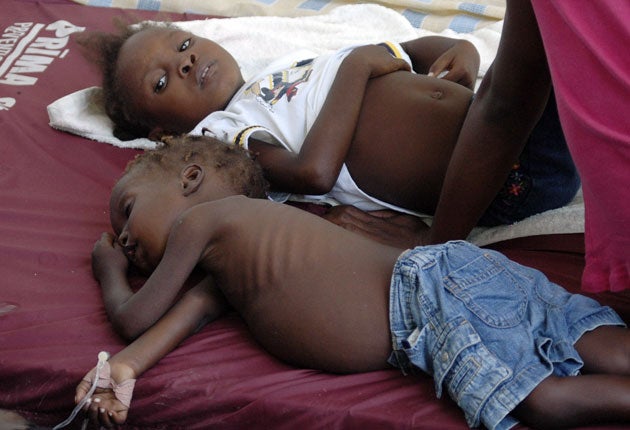Health crisis in Haiti as cholera epidemic reaches the capital
Hospitals and clinics struggle to cope with steady stream of seriously ill patients

The death toll kept rising in Haiti yesterday as hopes of containing an outbreak of cholera receded with news that the disease had arrived in the capital, Port-au-Prince, where more than a million people are still homeless because of January's earthquake.
Officials said that 253 victims are already dead and 3,015 cases of the highly infectious disease have now been confirmed. But the real figure could already be far higher, as scores of seriously ill patients continue to stream into over-stretched hospitals and clinics across the country.
Five people who arrived in Port-au-Prince from the countryside on Saturday tested positive for 01 cholera – the most deadly strain – while another five were diagnosed in the nearby town of Arcahaie. A further 50 cases were reported at a prison in Mirebalais, north of the capital, and ten more emerged in the northern city of Gonaïves.
It could already be too late to prevent an epidemic sweeping through the country, say public health officials. They are particularly concerned by reports of cases in the Carrefour and Croix-de-Bouquet neighbourhoods of the capital, which could serve as transfer points for the disease since both are major transport hubs.
"We are in a sanitary crisis," said Alex Larsen, Haiti's health minister, after a crisis meeting with President René Préval. "This is a new woe for the country which has not seen this disease in the past."
He urged citizens not to drink unpurified water, to wash their hands regularly, and to cook their food properly. That is, however, much easier said than done in the poverty-stricken country.
In rural areas – to where many Haitians fled after the earthquake which killed 300,000 people and left another 1.5 million homeless – communities are almost completely reliant on water that comes straight from rivers and streams. Locals therefore face a straightforward choice: risk infection, or go thirsty.
In the Artibonite and Central Plateau regions, where the cholera outbreak began on Wednesday and the majority of cases have been reported, thousands of people are now lining the roads, carrying buckets in search of either clean water or supplies of chlorine and purification tablets.
With temperatures of 35C, the mood is turning increasingly desperate and outbreaks of violence have been reported. One man was severely injured after being crushed under the wheels of a water truck, in a melee that broke out just outside the city of St Marc.
The nearest major hospital, St Nicolas, is the epicentre of the crisis. Eric Lotz, of the aid organisation Operation Blessing, described scenes there as "horrific", with dead and dying patients lining every ward and corridor, and scores of others being treated outside, on sheets stained with human faeces.
Cholera can kill in a matter of hours, with most victims dying from severe dehydration. But treatment is hard to come by. Vast crowds are converging on St Nicolas carrying sick friends and relatives. However resources are limited and some are waiting for a day or more to receive medical attention, by which time it is too late.
"There is bedlam outside the gate," Mr Lotz told CNN yesterday. "Inside [the hospital], every square inch is covered with people."
Another aid worker, Terry Snow, of the organisation Youth With a Mission, told how a man had died in the back of his truck outside St Nicolas after being driven to a series of full clinics and failing to find medical attention. "It's very chaotic," he said. "People are trying to figure out what to do. People are lost."
Jacob Kushner, a reporter for the Associated Press, told how doctors at St Nicolas struggled to save one patient, 55-year-old Jille Sanatus. "He's completely dehydrated," Dr Roasana Casimir said. "It's hard to find the vein." After several attempts, she managed to rig up an intravenous bag to feed fluid into Mr Sanatus's body. But it was to no avail: half an hour later, the father of 10 was dead.
Cholera, a water-borne bacterial disease, spreads quickly in crowded and unsanitary conditions. If it arrives in one of the roughly 1,000 camps in and around Haiti's capital, aid workers fear that it could infect hundreds of people in a matter of just a few hours.
"Now that we know the disease has arrived in Port-au-Prince, our priority is to distribute chlorine and chloride solutions to the camps to prevent it taking hold there," said Melody Munz, of the International Rescue Committee. "It's rainy season, so there's already a lot of mud and potential for flooding. Our concern is that if we get an outbreak in a camp, then it could spread very, very quickly.
"Even before the earthquake, only 30 per cent of Haitians had access to proper sanitation in urban areas, and 20 per cent in rural ones," she added. "Today, there is roughly one toilet for every 50 people, so it won't take very much for them to get sick."
Join our commenting forum
Join thought-provoking conversations, follow other Independent readers and see their replies
Comments
Bookmark popover
Removed from bookmarks